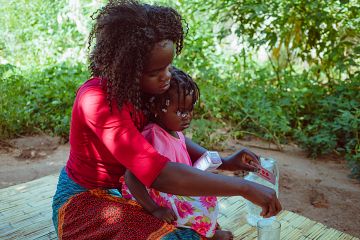Research shows improved malaria treatment is the most cost-effective approach to improving health outcomes in children
22 February 2023
A study published in Malaria Journal by a team of researchers from organisations including the University of Michigan, Malaria Consortium, Mozambique’s Ministry of Health and USAID has found that malaria treatment, whether alone or in conjunction with improvements in testing, is the most cost-effective approach to identify and treat malaria in children under five years old in Mozambique.
Mozambique has the fourth-highest number of malaria cases in the world and accounts for 29 percent of all deaths, with 39 percent of malaria deaths occurring in under-fives. Awareness about malaria is widespread in the country, but appropriate management of malaria cases is far from universal, including availability of malaria diagnosis tools, as well as appropriate treatment.
Around half of malaria cases do not receive the recommended treatment, while a large proportion of suspected cases are presumptively diagnosed and treated, in line with a historic standard practice in sub-Saharan Africa. This practice contributes to overtreatment with anti-malarials for tested negative cases and has contributed to the emergence of drug-resistant strains.
In 2010, the World Health Organization (WHO) changed the recommendation for the management of uncomplicated malaria from presumptive diagnosis to a ‘test-and-treat' strategy or prescription of artemisinin-based combination therapy, after laboratory confirmation of malaria – either by microscopy or rapid diagnostic tests (RDTs).
As part of one of only a few studies around case management cost-effectiveness, the team implemented a cost-effectiveness analysis of alternative policy options of the WHO-recommended ‘test-and-treat' strategy. The study uses a decision-analytic model to estimate the costs of each scenario and their associated benefits in terms of quality-adjusted life years gained, disability-adjusted life years averted, and lives saved, to support the National Malaria Control Programme (NMCP) in Mozambique in implementing its malaria strategy.
The researchers found that improving testing rates alone among under-fives at risk for malaria, whether by 10 percent or reaching the ultimate target of 100 percent, has the potential to improve health outcomes but may not be the most efficient use of limited resources. Instead, improvements in treatment, aided by the availability of malaria drugs at health facilities, either alone or in combination with improvements in testing, are the most cost-effective strategies targeting children under five in Mozambique.
“After looking at different scenarios, the research suggests that a cost-effective way to tackle malaria in Mozambique is to only treat children for malaria if they have a positive malaria test. This is more effective in terms of costs and positive health outcomes because children who are treated with anti-malarials but do not have malaria might develop other complications, which may lead to negative health outcomes and added cost”, said Neide Canana, Research Coordinator,Malaria Consortium Mozambique.
As a country with limited resources, Mozambique is looking to develop more effective malaria control strategies to increase the benefits to the population. Mozambique’s National Malaria Strategic Plan (2017-2022) focuses on reducing malaria morbidity and mortality by at least 40 percent. The government’s objective is to test 100 percent of suspected malaria cases and treat 100 percent of confirmed malaria cases at health facility and community level by the end of the strategy period.
Related content
27 January 2023
Seasonal malaria chemoprevention intervention scaled up for the first time outside the Sahel
1 December 2022Malaria Consortium presents data quality evaluation results to Mozambique’s Ministry of Health at national malaria strategy meeting
Latest news
- Malaria Consortium honoured by Ugandan government for contribution to combat malaria23rd April 2024
- International summit calls for AMR accountability in public health interventions21st March 2024
- Global SMC community celebrates new milestone at SMC Alliance Annual Meeting in Nigeria6th March 2024
- Scaling up key interventions could halve pneumonia-related childhood mortality13th February 2024
- Malaria Consortium and eGov Foundation join Mozambique’s national malaria programme to digitalise seasonal malaria chemoprevention campaigns8th February 2024
- World’s first malaria vaccine rollout launched in Cameroon22nd January 2024